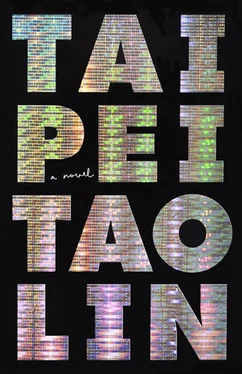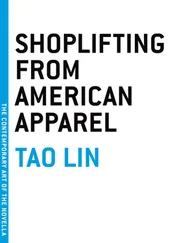As Erin’s car slowly accelerated away from the police car, onto the Williamsburg Bridge, one person, then another, said they were illegally carrying drugs. After a peculiarly awkward, car-wide silence that became comical when someone asked if every person in the car was illegally carrying drugs, eliciting three affirmations and a sort of confirmatory announcement that every person — Erin, Paul, Daniel, Fran, Mitch, Juan, Jeannie, Jeremy — was illegally carrying drugs, there was the immediately space-filling noise of a small crowd laughing, which continued for around five seconds, during which Paul (who, in sharing his seat with Fran, was partly turned toward the driver’s window) watched the police car, or a police car, zoom past in the left lane, with emergency lights on and sirens off, quick and soundless as an apparition or the hologram of itself.
In DuMont Burger’s bathroom Paul swallowed half of half a 30mg Oxycodone and.5mg Xanax, feebly amused to be already deviating, in moderate excess, from his plans to ingest specific amounts of drugs at certain times during his book tour, September 7 to November 4. To determine what amount of what drugs — MDMA, LSD, any benzodiazepine, amphetamine, opiate — he should ingest, on what days, to minimize anxiety and boredom for himself and others, he’d edited the seven-page itinerary from his publisher to fit on one page and, in an idle process he’d enjoyed, the past few weeks, studied each event in context, writing notes on the paper. He’d printed a final draft, currently in his pocket, that said he should ingest something — specified, in most instances, by type and amount — before twenty-two of his twenty-five events and some miscellaneous things such as the day a writer from BlackBook was writing an article about “hanging out” with him while doing that.
Paul splashed water on his face, which he dried, then returned to his seat, next to Juan, who was talking to Jeremy about whether a horse could win “best athlete of the year.” Erin, the only person Paul felt like talking to, at the moment, was out of range, so when two acquaintances who didn’t know anyone else arrived Paul sat with them at a four-person table, where he felt self-conscious about the tenuousness of his situation — he hadn’t ordered food because he was nauseated from the Oxycodone and long car ride and he didn’t have anything he wanted to say to anyone. When a friend of the acquaintances arrived, sitting at the table’s fourth seat, Paul fixated on her — maybe partly to justify his increasingly pointless, idle presence — in an exaggerated manner (asking her questions continuously while sustaining a “concentrating expression” with such intensity, muddled by the onset of the drugs he’d used in the bathroom, that he sometimes felt able to sense the weight of the microscopic painting of the restaurant’s interior, decreased by a dimension and scaled down to almost nothing, resting on the top curvature of his right eyeball) that felt conducive to abruptly stopping and leaving, which he did, after around fifteen minutes of increasingly forced conversation, walking six blocks to his room.
After blearily looking at the internet a little, then peeing and brushing his teeth and washing his face, he lay in darkness on his mattress, finally allowing the simple insistence of the opioid, like an unending chord progression with a consistently unexpected and pleasing manner of postponing resolution, to accumulate and expand, until his brain and heart and the rest of him were contained within the same song-like beating — of another, larger, protective heart — inside of which, temporarily safe from the outside world, he would shrink into the lunar city of himself and feel and remember strange and forgotten things, mostly from his childhood.
Paul’s book tour’s fourth reading — after another in Brooklyn and one at a Barnes & Noble in the financial district — was in Ohio, on September 11. Calvin, 18, and Maggie, 17, seniors in high school who’d been friends since middle school and were currently in a relationship, had invited Paul and Erin and other “internet friends” to read at a music festival and stay two nights in Calvin’s parents’ “mansion,” as Paul called it.
The day after the reading Paul and Erin ingested a little LSD and shared a chocolate containing psilocybin mushrooms and sat in sunlight in Calvin’s backyard, which had a hot tub and swimming pool and skateboard ramp and basketball hoop, “working on things” on their MacBooks. When Calvin returned from school they got in his SUV to go to Whole Foods, where Maggie was meeting them after work at American Apparel, and shared another chocolate. Calvin, who hadn’t wanted any, meekly asked if maybe he’d feel good if he ate only a small piece, seeming like he wanted to be encouraged to try.
“We already ate it,” said Paul, and laughed a little, in the backseat.
Erin, in the front passenger seat, was still holding a piece. Hearing Calvin she had seemed to slow its movement toward her mouth. She made a quiet, inquisitive noise and glanced slightly toward Paul, then resumed a normal speed and placed it inside her mouth. Paul lay on his back for most of the drive, sometimes sitting to noncommittally mumble something relevant, including that he liked Stereolab and Rainer Maria, to what he could hear of Calvin and Erin’s conversation. Walking toward Whole Foods, across its parking lot, Paul said he was “beginning to feel the LSD, maybe.”
“Really?” said Erin. “I feel. .”
“I don’t know,” said Paul.
“I can’t tell what I feel,” said Erin, and automatic doors opened and they entered the produce section, where they held and examined different coconuts. Calvin stood looking back, seeming tired and a little afraid, like a reclusive uncle supervising his unruly niece and outgoing nephew.
“You should get one,” said Paul. “It’s refreshing.”
“I’m. . allergic,” said Calvin a little nervously.
“Shit,” said Paul grinning. “I forgot. Again. Sorry.”
The next few minutes, while Paul and Erin went to three different sections — butcher, pizza, sushi — to get their coconuts opened, Calvin remained at a far distance, randomly and inattentively picking up and looking at things and sometimes glancing at Paul and Erin with a worried, socially anxious expression. Something about Calvin, maybe a corresponding distance or that they had similar body types, reminded Paul of Michelle, the night of the magazine-release party, waiting with slack posture at a red light, before she touched his arm and leaned on the metal fence. Paul, in line to pay, considered saying the word “Kafkaesque” to describe getting their coconuts opened, but was distracted by an eerily familiar actress’s smiling face on a magazine cover and remained silent, then paid and maneuvered to a booth and sat by Erin, across from Calvin, who stared at them with wet eyes and a beseeching, insatiable, inhibited expression that alternated between Paul and Erin to keep both, Paul thought, locked into his meekly laser-like gaze. Paul held his left hand like a visor to his forehead and looked down and sometimes said “oh my god.” Whenever he glanced at Erin, who seemed to be enjoyably displaying an unceasing grin, he laughed uncontrollably and, due to the contrast with Calvin’s alienated demeanor, felt more uncomfortable. Unsure how to stop grinning, or what to do, he left the booth for straws. When he returned, after feeling mischievous and Gollum-like for two to three minutes while trying to secretly record Erin and Calvin with his iPhone, he lowered himself skillfully, he felt, in a 180-degree turn, like that of a screw, to a seated position, flinging a straw at Erin while connecting the awning of his left hand to his forehead. He moved his coconut to his lap and heard a partially metallic, imaginary-sounding noise. He stared without comprehension, but also without confusion, at Calvin’s body, which was hunched close to the table with demonically jutting shoulder blades rising and falling in rhythm to what sounded like a computer-generated squawking. The cube of space containing Calvin seemed to be reconfiguring itself, against passive resistance from the preexisting configuration of Calvin, mutating him in a process of computerization. Paul thought he was witnessing a kind of special effect, then realized Calvin was imitating a pterodactyl.
Читать дальше












